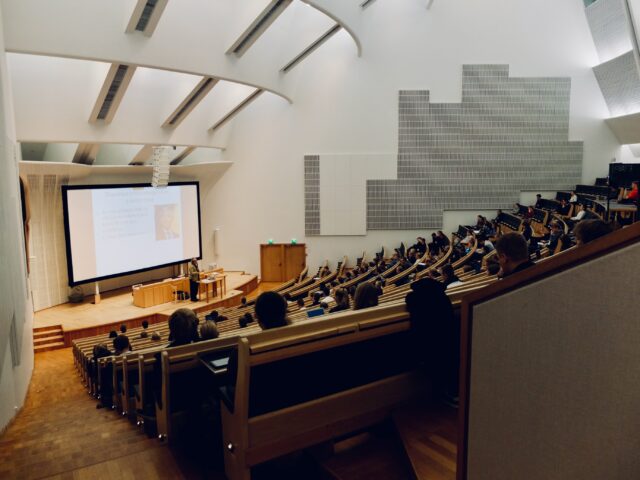Universities Canada has launched Action for Net Zero, a climate initiative that brings together Canadian universities to mitigate and address the impacts of climate change. Members will share data that will be used to measure and track the sector’s climate progress; share best practices; and collaborate on local, national, and international levels to strengthen the impact of climate actions. “Through the Action for Net Zero initiative, I believe Canada’s universities can maximize our impact in addressing this most urgent global priority,” said Universities Canada Chair Meric Gertler.

Top Ten News
April 28, 2023
The University of Waterloo has signed a Memorandum of Understanding (MOU) with the National Institute for Research in Digital Science and Technology (INRIA) in France. The MOU builds upon UWaterloo’s ongoing strategic partnerships with research institutions in France and outlines a framework for further cooperation and collaboration. The two partners have previously researched issues pertaining to information and communications technologies, cybersecurity, robotics, and more. UWaterloo credits the foundations of the collaboration to Raouf Boutaba, Director of the Cheriton School of Computer Science, who first recognized the benefits of facilitating research partnerships between UWaterloo and French institutions.
Faculty and staff associations from North Island College, Royal Roads University, University of Victoria and Vancouver Island University have signed and sent an open letter to British Columbia Premier David Eby and BC Minister of Post-Secondary Education and Future Skills Selina Robinson. The letter urges the Government of British Columbia to address the cuts and layoffs taking place at postsecondary institutions. It also notes that BC’s postsecondary institutions have become over-reliant on tuition fees, particularly the fees paid by international students, which they state is both unfair to students and results in a system that is vulnerable to enrolment fluctuations. The unions recommend a variety of measures, including securing international student enrolment, easing some entry requirements and experimenting with tuition levels, stabilizing employment with dedicated bridging funding and/or emergency temporary transfers, and encouraging the retention and promotion of sessional lecturers.
AI technology’s recent leaps forward have left many postsecondary professionals stunned, but John Gill writes that a failure to respond could leave a postsecondary institution in the position of a “slowly boiled frog, unable to spot the danger before it turns into green soup.” Gill interviews industry representatives about the way digital transformation has progressed and discusses the importance of taking advantage of the opportunities presented by these transformations. “Whether change is gradual or sudden, the key is not to be left behind: to be alive to both the threats and the opportunities, while taking care not to get caught up in hype, nor fall victim to complacency,” concludes Gill.
The Government of Canada has recognized 10 postsecondary institutions through the Dimensions: equity, diversity, and inclusion Canada program for their contributions to equity, diversity, and inclusion. The program acknowledges institutions that have worked to address EDI in their research environment at one of four stages: Stage 1 – Foundation, Stage 2 – Construction, Stage 3 – Consolidation, and Stage 4 – Transformation. Recognitions were distributed for the first two stages this year. Mohawk College, Mount Saint Vincent University, University of Ottawa, and the University of Winnipeg were recognized under Stage 1-Foundation. Sheridan College, Toronto Metropolitan University, Université Laval, the University of British Columbia, the University of Calgary, and Wilfrid Laurier University were recognized under Stage 2-Construction.
Postsecondary educators continue to grapple with the student use of artificial intelligence – like ChatGPT – in the classroom. CBC reports that Cambrian College Instructors Nathan Abourbih and Jessica Joy have hosted workshops for faculty to discuss how ChatGPT could be used to benefit classroom discussions. Abourbih and Joy stress that AI is here to stay and that proactive institutional policies will be needed to cope with its presence. Global Newsexamined the use of AI tools in Manitoba classrooms. Francois Jordaan, an academic integrity specialist from the University of Manitoba, emphasized the importance of getting to know individual students’ writing styles in order to detect AI-related deviations. Nadine Ogborn of Red River College Polytechnic added that academic integrity breaches related to ChatGPT are the exception, not the rule, and asserted that most students remain academically honest.
Université Laval and Université du Québec en Abitibi-Témiscamingue have unveiled a new joint research consortium on wood-based composite panels. The consortium aims to provide provincial and national companies with high-level research and innovative solutions for diversifying their sources of raw materials, optimizing their manufacturing processes, and developing new products. ULaval and UQAT will carry out the project alongside le Conseil de l’industrie forestière du Quebec (CIFQ) and the ministère des Ressources naturelles et des Forêts (MRNF). The project has received $4M in combined funding over five years from funding agencies and industry partners.
Laurentian University has received $5M in combined funding from the federal and provincial government to support two initiatives at the core of the university’s bilingual mandate. The first initiative will support the maintenance and development of programs serving students whose second language is French, while the second initiative involves creating a language laboratory and conversation workshop to support second-language learning. The language laboratory will include free self-learning tools, guided self-study with activities and resources, and integrated self-learning.
Newfoundland and Labrador Premier Andrew Furey reportedly intends to re-evaluate the funding for Memorial University’s tuition freeze. Furey noted the recent instability at the university and said that the provincial government does not want to add more instability to the situation. Memorial Student Union Director of External Affairs John Harris expressed hope that the tuition offset could be refunded and reiterated the student union’s previous concerns about what CBC calls the “secrecy” surrounding the decision to raise tuition. Memorial Faculty Association organizer Lucien Ashworth said that greater transparency and collegial governance was “one of the four main issues during the [recent faculty] strike,” and stated that it has welcomed a commitment to greater transparency from the university and NL.
In a recent article from University Affairs, John Loeppky highlights the challenges that scholars with disabilities face when trying to gain accommodations within the postsecondary sector. Loeppky writes that the path to accommodations for instructors with disabilities is particularly difficult and often includes informal agreements, bureaucracy, challenges with human resources departments, and a culture of secrecy. The author discusses the standards universities in Canada must meet to accommodate disabled employees and highlights the steps taken at institutions such as the University of Waterloo and Université du Québec à Montréal to create a more inclusive environment.
